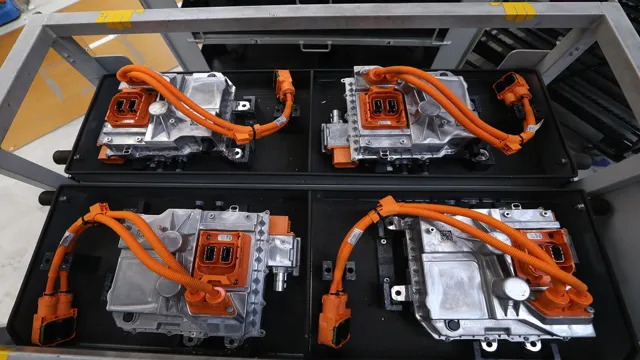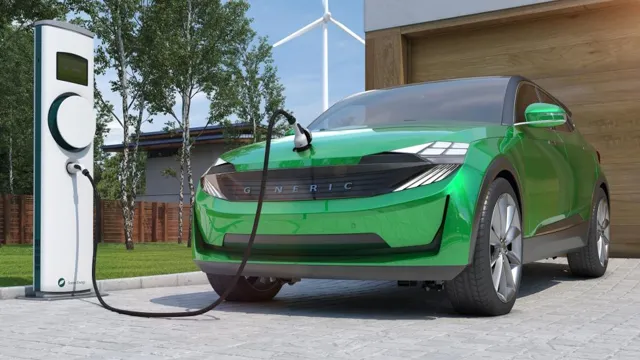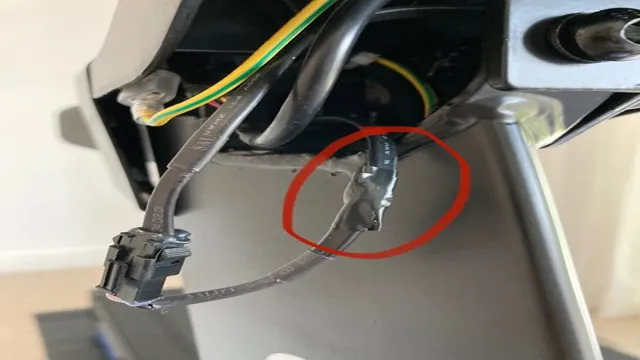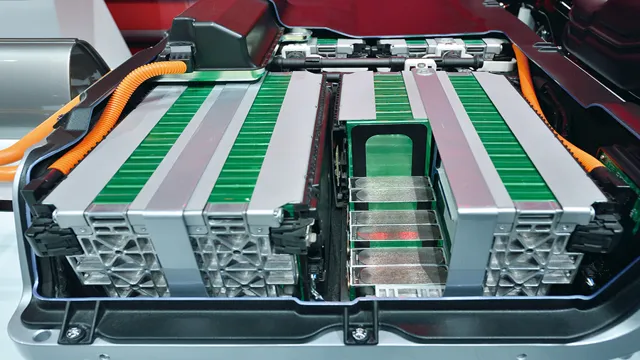The Shocking Truth About Car Electric Batteries: Your Ultimate Guide
As we move towards a greener future, more and more industries are turning towards sustainable practices. The automotive industry is no exception, with the production of electric cars on the rise. However, one of the biggest concerns for electric car owners is the lifespan and efficiency of their car batteries.
With current technology, the average electric car battery lasts around 100,000 miles before needing a replacement. But what does the future hold for car batteries? Will we see longer-lasting batteries with faster charging times? What breakthrough technologies are on the horizon? The future of car batteries holds immense potential for the electric vehicle industry. Major car manufacturers, such as Tesla, are investing millions in battery research and development.
One of the most promising routes is solid-state batteries. Instead of using a liquid electrolyte, solid-state batteries use a solid material, which results in faster charging times, longer longevity, and increased energy density. If successful, these batteries could revolutionize the electric vehicle market and make them more accessible to the general public.
Another area where breakthroughs are being made is in the recycling and disposal of car batteries. Currently, disposing of old car batteries presents a significant environmental concern. However, companies are exploring ways to repurpose old batteries or recycle their materials to reduce the amount of waste generated.
Some organizations are even developing second-life applications in which old batteries can be repurposed for energy storage in non-automotive applications. The future of car batteries shows much promise, but significant challenges exist. One of the biggest hurdles is the cost of production.
Currently, electric car batteries are expensive to produce, making electric vehicles more expensive than their gas-powered counterparts. However, as technology improves and economies of scale come into play, we can expect to see costs decrease and electric vehicles become more affordable. Overall, the future of car batteries is exciting and holds great potential for the electric vehicle industry.
Why Go Electric?
Car electric batteries are becoming increasingly popular as more people opt for environmentally-friendly transportation solutions. Not only do electric cars produce zero emissions, but they also offer a quieter and smoother driving experience compared to traditional gas-powered vehicles. Additionally, electric cars are more cost-effective in the long run since they require far less maintenance and fuel costs.
The advancements in battery technology have made electric cars increasingly more viable, as they can now achieve comparable distances on a single charge to their traditional counterparts. Thanks to the increasing availability of charging stations, range anxiety is becoming less of a concern for those looking to make the switch to an electric car. With the electric car industry booming, car electric batteries are paving the way for a sustainable transportation future.
Environmental Impact
Electric vehicles have become increasingly popular due to their environmental impact. Traditional gasoline-powered vehicles emit harmful pollutants, including carbon dioxide, nitrogen oxides, and particulate matter, which contribute significantly to air pollution, global warming, and climate change. By transitioning to electric vehicles, we can significantly reduce our carbon footprint and minimize the damage to our planet.
Electric vehicles run on renewable energy sources such as wind and solar power, which emit no pollutants and are significantly cleaner than fossil fuels. Additionally, they are more energy-efficient, with electric motors converting over 80% of electrical energy into motion, while traditional gasoline engines convert only around 20%. So, if we are genuinely concerned about our environment and reducing our contribution to climate change, it’s time to consider going electric.
By switching to electric vehicles, we can significantly reduce our greenhouse gas emissions, air pollution, and dependence on fossil fuels, thus ensuring a better future for our planet and future generations.
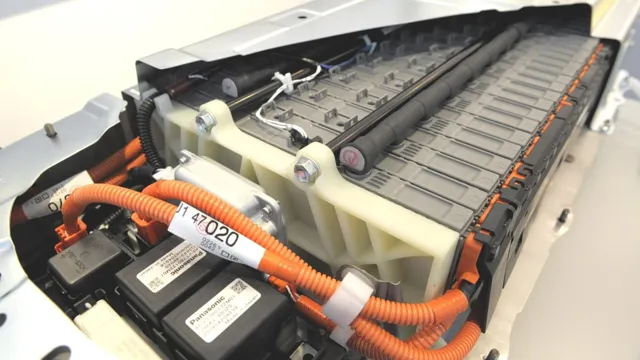
Fuel Efficiency
Fuel efficiency is a hot topic in today’s world, and people are choosing electric vehicles for a variety of reasons. Electric cars are becoming increasingly popular as they are not only environmentally-friendly but also cost-efficient. When compared to gas-powered cars, electric cars cost less to maintain and fuel up.
This is because electric cars run on electricity, which costs significantly less than gasoline. In addition, electric cars have instant acceleration and are typically simpler to drive than their gas-powered counterparts. Furthermore, electric vehicles contribute less to air pollution and greenhouse gas emissions, making them a sustainable choice for car owners.
Investing in an electric vehicle is not only an excellent choice for the environment, but it also helps to save money in the long run. By going electric, you can enjoy a fuel-efficient, environmentally-friendly ride.
How Electric Car Batteries Work
Car electric batteries are the life force of electric vehicles, powering them much like how gasoline fuels traditional cars. But how do these batteries actually work? It all starts with the chemical reaction that occurs within the battery’s cells. Each battery is made up of numerous cells that contain an anode, a cathode, and an electrolyte.
When the battery is charged, an electrical current flows from the anode to the cathode, with the help of the electrolyte. During this process, the anode releases ions into the electrolyte solution and the cathode absorbs those ions, creating a flow of electricity. When the battery is depleted, the process is reversed with the ions moving back to the anode, ready to be recharged again.
Car electric batteries have come a long way in recent years, offering longer driving ranges and faster charging times, making electric vehicles a more practical choice for everyday use.
Lithium-Ion Technology
Lithium-ion technology is the driving force behind electric car batteries. These batteries are made up of multiple cells, which consist of a cathode, an anode, and an electrolyte. When the battery is charged, lithium ions from the cathode move through the electrolyte to the anode, where they are stored.
When the battery is discharged, the ions move back to the cathode, generating electrical energy. One of the key advantages of lithium-ion technology is its high energy density, which means that it can store a lot of energy in a small space. This is crucial for electric vehicles, which need to be able to travel long distances on a single charge.
Additionally, lithium-ion batteries are lightweight and have a long lifespan, making them an ideal choice for use in electric vehicles. As electric car technology continues to advance, we can expect to see even more efficient and powerful lithium-ion batteries powering the cars of the future.
Battery Range
Battery range is an essential factor to consider when it comes to electric cars. The battery range is the distance that an electric car can cover on a single full charge of its battery pack. It is determined by the capacity of the battery, the electrical efficiency of the motor, the weight of the vehicle, and other factors.
Electric car batteries work by converting chemical energy stored in the battery cells into electrical energy that powers the electric motor, which propels the vehicle. The batteries in electric cars are built with several thousand battery cells connected in series and parallel to create a high-voltage battery pack. The battery range of an electric car varies depending on factors like driving habits, weather conditions, and terrain.
In general, electric cars with larger battery packs have a longer range than those with smaller battery packs. The key to maximizing the range of an electric car is to drive smoothly and maintain a constant speed, avoid abrupt acceleration and braking, and limit the use of energy-consuming accessories like air conditioning and heating. With advancements in battery technology, electric car batteries are becoming more efficient, enabling them to achieve longer ranges with each passing year.
Charging Methods
Electric car batteries are designed to store energy, allowing electric vehicles to operate without the need for gasoline. These batteries can be charged in a variety of ways, such as using a standard household outlet, a public charging station or a specialized electric vehicle charging station. The charging process varies depending on the method used, with some chargers providing faster charging times than others.
For example, a standard household outlet typically provides slower charging times, while a specialized charging station can charge an electric vehicle much faster. It’s important to note that the type of charger used can also impact the battery’s lifespan, as certain charging methods can lead to degradation or overheating. Therefore, it’s recommended that electric vehicle owners consult their vehicle’s manual to determine the optimal charging methods for their battery type.
By understanding how electric car batteries work and how they can be charged, electric vehicle owners can maximize their battery life and enjoy the benefits of eco-friendly transportation.
Top Car Electric Batteries on the Market
Car electric batteries are becoming increasingly popular as electric cars gain traction in the market. There are several top-performing car electric batteries available for consumers, but one of the most reliable is Tesla’s Model S battery. This battery has a range of up to 373 miles, which is more than enough for most people’s daily use.
Another great option is the Panasonic EV Energy Company’s battery, which is used in many popular electric vehicles such as the Nissan LEAF. This battery has a range of up to 226 miles and a fast-charging capability that can charge up to 80% of the battery in just half an hour. Other notable car electric batteries include those from LG Chem, Samsung SDI, and BYD.
With advancements in technology, car electric batteries are only getting better, and we can expect to see even more impressive options in the near future.
Tesla Model S Battery
When it comes to electric cars, one of the most important components is the battery. And one of the top car electric batteries currently on the market belongs to the Tesla Model S. This sleek and stylish sedan boasts an impressive range of up to 402 miles per charge – more than any other electric car on the market today.
But what really sets it apart is its innovative battery technology. The Model S uses thousands of individual lithium-ion battery cells, arranged into a flat, rectangular shape that’s designed to maximize energy density and minimize weight. This allows it to deliver unparalleled performance while still offering plenty of space for passengers and cargo.
And with Tesla’s commitment to sustainability and renewable energy, you can feel good about driving one knowing you’re doing your part for the planet. So if you’re in the market for a new electric car, be sure to check out the Tesla Model S – it’s not just a great car, it’s a game-changer.
Nissan Leaf Battery
The Nissan Leaf Battery is one of the top car electric batteries on the market. It uses lithium-ion technology, which provides long-lasting power and a fast charging time. This battery has a capacity of 40 kilowatt-hours, and it can go up to 150 miles on a single charge.
It’s perfect for daily commuters and those who need a reliable car battery that can handle city and highway driving. Additionally, the Nissan Leaf Battery is eco-friendly and produces zero emissions, making it an excellent choice for drivers who want to reduce their carbon footprint. Overall, the Nissan Leaf Battery is an exceptional choice for anyone looking for a reliable, high-performing car battery that can help them save money on gas and contribute to a healthier planet.
How to Maintain your Car Electric Battery
Car electric batteries are a crucial component in today’s vehicles. To keep your battery running smoothly and prolong its lifespan, it’s essential to follow some basic maintenance practices. One of the most important things you can do is to keep your battery clean.
Dirt and grime can accumulate on the terminals and cause the battery to lose power, so be sure to remove any debris with a wire brush and a mixture of baking soda and water. Additionally, check your battery’s water level regularly and top off with distilled water when necessary. Another tip to prolong your battery’s life is to avoid leaving the car’s electrical system on when the engine is not running, as this can put unnecessary strain on the battery.
Finally, consider investing in a battery charger or maintainer to keep your battery fully charged when the car is not in use for extended periods. By following these simple tips, you can help maximize the lifespan of your car electric battery and keep it running smoothly for years to come.
Conclusion
In conclusion, car electric batteries are the unsung heroes of the modern road. They allow us to zoom by gas stations and polluting emissions, but do require a bit of TLC to keep them charged and ready for action. While the technology will likely continue to evolve and improve, let’s not forget to give these electric powerhouses the credit they deserve.
After all, without car electric batteries, we’d all be stuck in neutral.”
FAQs
What are car electric batteries made of?
Car electric batteries are typically lithium-ion batteries, which have a higher energy density and longer lifespan than traditional lead-acid batteries.
How long do car electric batteries last?
The lifespan of a car electric battery can vary depending on factors like usage, charging habits, and environmental conditions, but they can typically last anywhere from 5 to 10 years.
What happens if a car electric battery dies while driving?
If a car electric battery dies while driving, the vehicle will gradually lose power until it comes to a complete stop. Once stopped, the battery will need to be recharged or replaced in order for the vehicle to start again.
Can car electric batteries be recycled?
Yes, car electric batteries can and should be recycled to reduce waste and recover valuable materials like lithium, cobalt, and nickel. Many automakers and battery manufacturers have programs in place to recycle used batteries.



